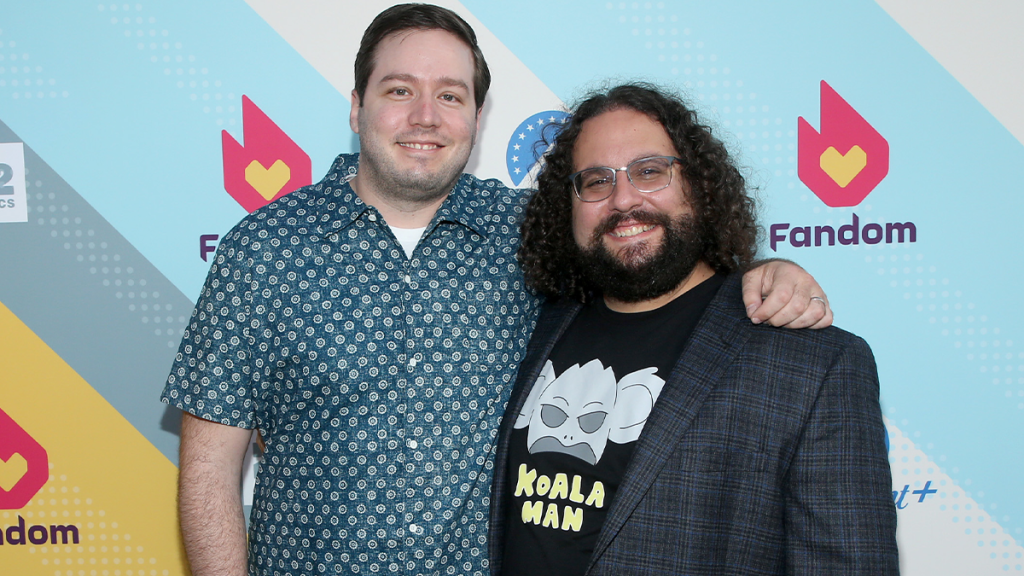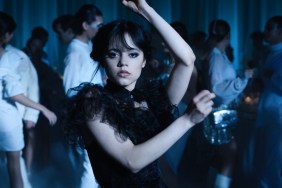ComingSoon Senior Editor Spencer Legacy spoke with Koala Man showrunners Benji Samit and Dan Hernandez about Hulu’s Australian animated comedy. The duo discussed trusting your creative partners and exposing the world to Australian concepts. All eight episodes of Koala Man are now streaming on Hulu.
“It follows middle-aged dad Kevin and his titular not-so-secret identity, whose only superpower is a burning passion for following rules and snuffing out petty crime in the town of Dapto,” reads the synopsis. “Though it may seem like any other Australian suburb, forces of evil both cosmic and man-made lie in wait to pounce on unsuspecting Daptonians. On a quest to clean up his hometown, and often roping his frustrated family into his adventures, Koala Man stands at the ready. He’ll do whatever it takes to defeat villainous masterminds, supernatural horrors, or worse: jerks who don’t take their rubbish bins down on the proper days.”
Spencer Legacy: You’ve both worked together, you know, a few times before. What, what makes your collaboration work so well?
Benji Samit: Oh, man. I mean, we’ve been writing together and producing together for a long time now. We met in college and we’ve been working together since then. I think it’s a few things. We have the same taste in what we enjoy, what we think is good, but we also complement each other in a lot of different ways.
Dan Hernandez: I think that Benji really put his finger on it, which is taste. I think that, sometimes, there’s a misconception that in a partnership, each person should be equally good at everything. I actually think that that’s not necessarily the key to a great partnership. I think that if everyone feels like they need to do everything all the time, then you’re naturally going to be butting heads over who’s going to take the first pass at a blank page, or who’s going to rewrite this. I think that what’s more important is having a vision for what you want the end product to be of something.
So when you can get artistically aligned, so for instance, something like this show where we’re like, “Well, we know we want it to be funny, of course, and shocking and crazy,” but between us, we wanted to set ourselves the goal of actually telling an amazing superhero story — almost clandestinely. But by the end of this season, looking back and going, “Oh, that really was a superhero story. It wasn’t just a goof, it wasn’t just a joke. Some epic stuff happened.” And so when you artistically align in that way, you can be a little bit more egoless about who’s doing what. You can sort of- focus on the things that you’re good at doing.
Since we are friends for so many years, having been working together since college, if Benji changes something that I’ve written, there’s no part of me that’s defensive at this point. And I think vice versa. Because of that, it allows us to really focus on the result rather than how we’re going to divvy up the work and who is going to do this and being uptight about that. A lot of time we don’t even remember who wrote what, at this point. Truly. I’ll think that he wrote something and he’ll think that I wrote it and the truth will be lost to time. I think that’s what, for us, has made our partnership so successful — trust, honestly, more than anything.
Benji, what about those original online Koala Man shorts made you go, “I want to do this series about Koala Man?”
Benji Samit: It was just so unique and different, and Michael Cusack’s voice — not just his literal voice, which is funny — but his perspective. His twisted view of Australia and life … they were just so funny and so refreshingly different from anything else we’ve seen. So we were so excited to just sit down with him and talk. From there, 10 minutes into sitting down with him, we knew, “We’re going to work on this together.” Where Dan and I have a great collaboration over many, many years, it was a similar thing with Michael, where the two of us and Michael just hit it off and were on the same page. So it’s one of those rare things.
Dan, Koala Man’s concept really revolves around taking a mundane issue and making it this enormous crisis. So what’s the process of making something like a forgotten jacket into a story about cannibalistic Wiggles?
Dan Hernandez: For me, as sort of my writer’s room philosophy, it all starts with what is a real human emotion or a human crisis or a human situation that any single person in the world can identify as being realistic, as opposed to over-the-top or surreal. I think that when you build the foundation of a story in a realistic way, it allows you to go as crazy as you ultimately want to go in the details of how it’s expressed. So for me, take, for instance, his jacket. When you’ve gone through things that are painful, some people like to talk about them, but a lot of people don’t like to talk about those incidents. What that episode was about was Kevin being forced to confront some uncomfortable truths about his past that he prefers not to think about.
So the jacket then became that mountain out of a molehill excuse to not have to think about those things. That felt very real to me just on a visceral level that when someone’s like, “Hey, I’ve really got to talk to you about this thing that’s extremely painful and traumatic,” you might be like, “Actually I’ve got to go do anything else right now.” That’s where that episode came from. Once we knew that that was the emotional foundation of that episode, that allowed us then to say we had had this idea about these Australian kid’s music bands and we were looking for the right delivery system for that.
So it was like, “Well, if he’s going out in the Outback, what’s the craziest, most absolutely messed up thing that he could find out there? That’s how we arrived at the Tigglies, being out there at Tigglies HQ, eating kids. I think it is that that melding of a real emotional story that allows you to take flight into whatever weird sphere you want to go to.
Benji, was there ever any concern that Australian concepts like show bags might not be fully understood by international audiences? Or were you confident in it?
Benji Samit: There was never really any concern. It was actually more excitement, you know? The reality is, like what a lot of our Australian writers pointed out to us, is they all grew up watching American TV, and there were American things on there, and they just sort of figured it out. They pieced it together, they [used] context clues, or they looked it up. You could figure it out. So we just flipped that on its head and threw some Australian stuff at the Americans to figure out.
But no, we were excited by all the Australian stuff because it’s one of those things of like … we’ve been in so many writers’ rooms now on American sitcoms and animated shows where it’s just, you come up with an idea and Simpsons did it. South Park did it, you know? American ideas have been done over and over. How many times have you done the homecoming dance or prom or this or that. But with this, anytime one of the Australian writers mentioned something uniquely Australian — there’s never been a primetime adult animated Australian show. Ever. Even in just Australia. It’s just never been done.
So any Australian concept that was like, “Oh, there’s an episode there,” no one’s ever done it before. So it was like super exciting that one of the writers casually mentions show bags, thinking that we knew what they were. We were like, “Wait, what? What’s a show bag?” And then they tell us, and they all got excited and we’re like, “Oh, we’ve got to do something with that.” So it was just really great how quickly we could come up with … [the] Great Emu War, things like that, where it’s just this weird Australian stuff that would translate to TV. Every now and then we put in some lines to help clarify and explain things, but for the most part, I think you can just sort of figure it out.
How is working with Michael Cusack? He not only is the creator, but he does voices and everything like that. What’s it like working with a creator with that more hands-on approach?
Dan Hernandez: It was a dream. Michael is a genius. He’s so talented as both an actor, a voice actor, a musician, and an animator. And so for us, having someone who — especially at the animation department — has a skillset that we simply don’t have, being able to pitch a character and looking over and five minutes later Michael is holding up a drawing of what that character is going to look like, was invaluable for us to really get a sense of who these people were, what they looked like, why they were funny. From that perspective, it was a dream. We also are huge fans of his work, independent of the work that we do with him. Smiling Friends and YOLO are two of my very, very favorite shows. Still to this day, watch them to relax. I’ve seen all the episodes like 20 million times.
So it helps to be a fan of someone’s unique voice. I think that what we brought to the process was that more extensive experience in American-style storytelling. Some of our movie work was useful in the sense of “How do you craft a longform story over the course of eight episodes and parcel out bits and pieces so that by the end, the last two episodes, everything comes together [in] a hopefully amazingly satisfying way?” He really trusted us to do that. Again, we come back to this idea of trust, like we really allowed everyone to work to the best of their ability with not a lot of critique or editorial nitpicking, because Michael’s one of the best at what he does in the world. And so we just said, “Make us look good!”







